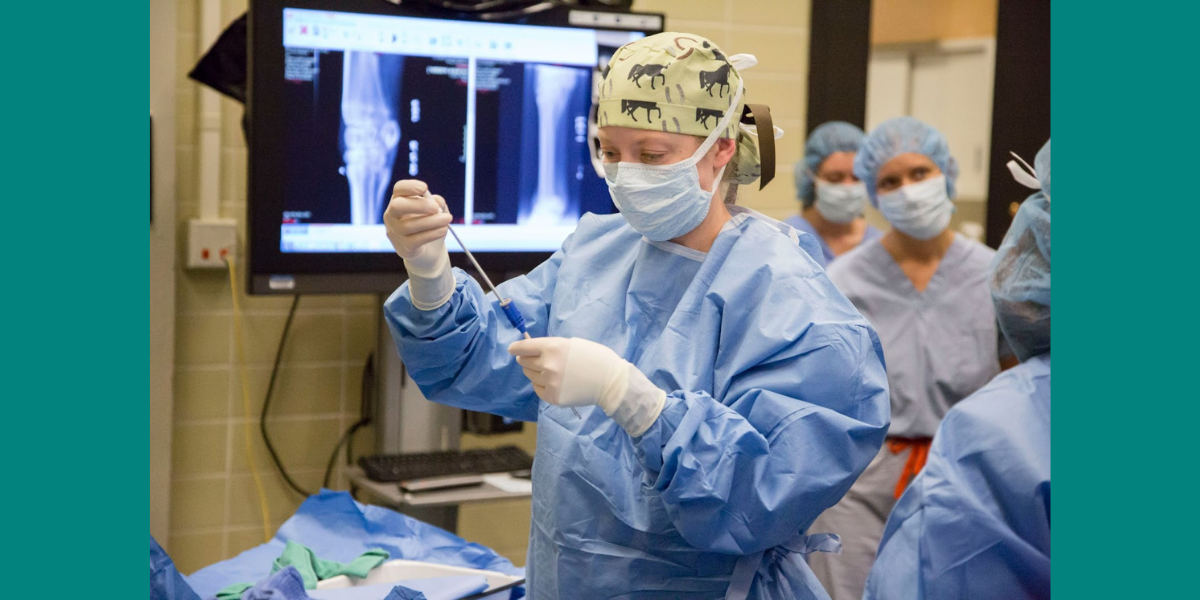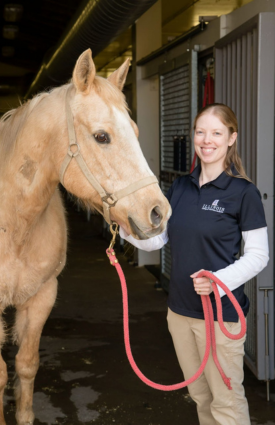Advancing the mission
CVM alumna Dr. Annette M. McCoy elected to ACVS Board of Regents with goals of increasing member engagement and volunteerism

CVM alumna Dr. Annette M. McCoy elected to ACVS Board of Regents with goals of increasing member engagement and volunteerism
Dr. Annette M. McCoy prepares a synovial resector for arthroscopic surgery. Photo courtesy of L. Brian Stauffer.
Dr. Annette M. McCoy’s involvement in the American College of Veterinary Surgeons (ACVS) isn’t new but the leadership role she’s taken on within the organization is.
McCoy, DVM, MS, ’14 PhD, an alumna of the University of Minnesota (UMN) College of Veterinary Medicine’s Comparative and Molecular Biosciences Program, was elected to the ACVS Board of Regents, the governing board for the ACVS and the ACVS Foundation. She also will serve as the board’s liaison to the Board of Trustees.
The ACVS was founded in 1965 as the specialty board that defines surgical excellence in the field of veterinary medicine. McCoy first joined the ACVS as a board-certified surgeon in 2011. In the time since, McCoy has regularly contributed to the ACVS as an abstract reviewer for the group’s annual meeting and as a five-year member of its examination committee. A prominent mentor of many junior members, McCoy is listed as a co-author on multiple presentations selected for an ACVS Outstanding Surgery Residents’ Award.
Taking a leadership role in professional societies is a key way for McCoy and other clinical and research scholars to shape the veterinary field by helping to set and maintain high standards. It also serves as a point of connection.

“Some of my most valued personal and professional relationships have come via the ACVS, both through my experiences as a resident and more recently via working on ACVS committees,” McCoy says.
As the youngest diplomate on the Board of Regents, McCoy’s goals for her tenure are to increase transparency surrounding the many processes the board oversees and to increase engagement and volunteerism among new diplomates—the future leaders of the ACVS. McCoy recalls feeling frustrated early on when passed over for volunteer opportunities before a mentor stepped-up to get her an invitation to participate. Now, McCoy is trying to pay that forward.
Throughout her education, training, and professional experiences, McCoy has learned from top leaders in the veterinary field. At the University of Minnesota, she was particularly inspired by the leadership qualities she saw in Dr. Cathy Carlson.
“What Dr. Carlson does so well is really listen to the people around her,” McCoy says. “She might not always agree with what they are saying, but she always makes others feel like they are heard.”
McCoy sees good listening and acknowledging others’ ideas as an effective tool to promote meaningful discussion and effective compromise. She also had an outstanding clinician-scientist role model in her primary PhD mentor, Dr. Molly McCue.
“Dr. McCue taught me to give trainees the space and independence to grow along their own path,” McCoy says. “Knowing she would always be there to support me when I needed help gave me the confidence to make my own decisions.”
Mccoy now practices this approach with her own research and clinical mentees. She works at the University of Illinois Urbana-Champaign College of Veterinary Medicine as an associate professor of equine surgery. Before completing her PhD at UMN, she earned her veterinary degree from Michigan State University and completed an equine surgery residency and master’s degree at Colorado State University.
In its mission statement, ACVS states one of its key objectives is a focus on post-graduate residency training and education for veterinary surgeons. McCoy personally advances this part of the mission in her current institution where she oversees an equine internship program and serves as the program director for the equine surgery residency program.
McCoy sees working with residents and interns as a way to make a lasting impact in the field and was inspired by the leadership of her own mentor, McCue.
“I love watching the transformation that happens as they progress through their program, growing in confidence as they master new skills, whether it’s a new surgical technique or effective client communication,” she says. “Hearing them share their success stories after completing their training and performing a procedure for the first time on their own is highly rewarding.”